

CLC CONNECTS
COVER: Katherine Torres, a 2025 recipient of CLC President’s Excellence in Leadership and Service Award, advocates for student equity on campus and in Springfield, all while balancing two jobs, an internship and studies in science and public service.

MESSAGE FROM CLC PRESIDENT DR. LORI SUDDICK
The mission of the College of Lake County is to ensure every student receives an equitable high-quality education. Fulfilling this commitment is achieved through the work of high-caliber faculty sharing knowledge, expertise, care and mentorship with students and a network of staff providing wraparound support, programming and resources students need to stay on their educational path. Fulfilling this promise also requires an integrated system of community and workforce partners.
At each graduation, I am filled with hope for the future. I am confident that each student leaves CLC with a memory of someone who welcomed them to the Lancer community, sparked new interests, connected them with resources they needed or provided encouragement along their path. I believe these connections continue beyond the college experience and build strong communities for Lake County.
As we conclude the 2024 Strategic Plan and embark on the 2030 plan, it is inspiring to witness how student and community-centered efforts have removed barriers and transformed outcomes so every student can be successful. This special issue of CLC Connects shares accomplishments and inspirational stories resulting from the collective and dedicated efforts of the CLC team. I hope you enjoy these reflections and share in our celebration of the path traveled and the opportunities ahead.



College of Lake County strives to be a place where every student succeeds, every employee thrives, so that every business achieves and every community grows.
Guided by this aspirational statement for the past six years, CLC improved equitable student success outcomes through intentional strategic efforts and leveraging workforce and community partnerships.
The 2024 Strategic Plan served as a road map accelerating CLC’s path toward recognition in 2025 as an Achieving the Dream Leader College of Distinction for its ongoing improvements in outcomes across all student groups. This designation recognizes and motivates sustained and proactive reform efforts that result in equitable student success outcomes.
“Becoming a Leader College of Distinction is a testament to the data-informed, whole-college transformation that CLC faculty and staff have activated over the past several years,” said CLC President Dr. Lori Suddick. “This designation means the evidence shows that the changes that have been implemented are making a difference in outcomes for students, which means we are making a difference in the diverse communities across Lake County.”
FUTUREFOCUSED: 2030 STRATEGIC PLAN
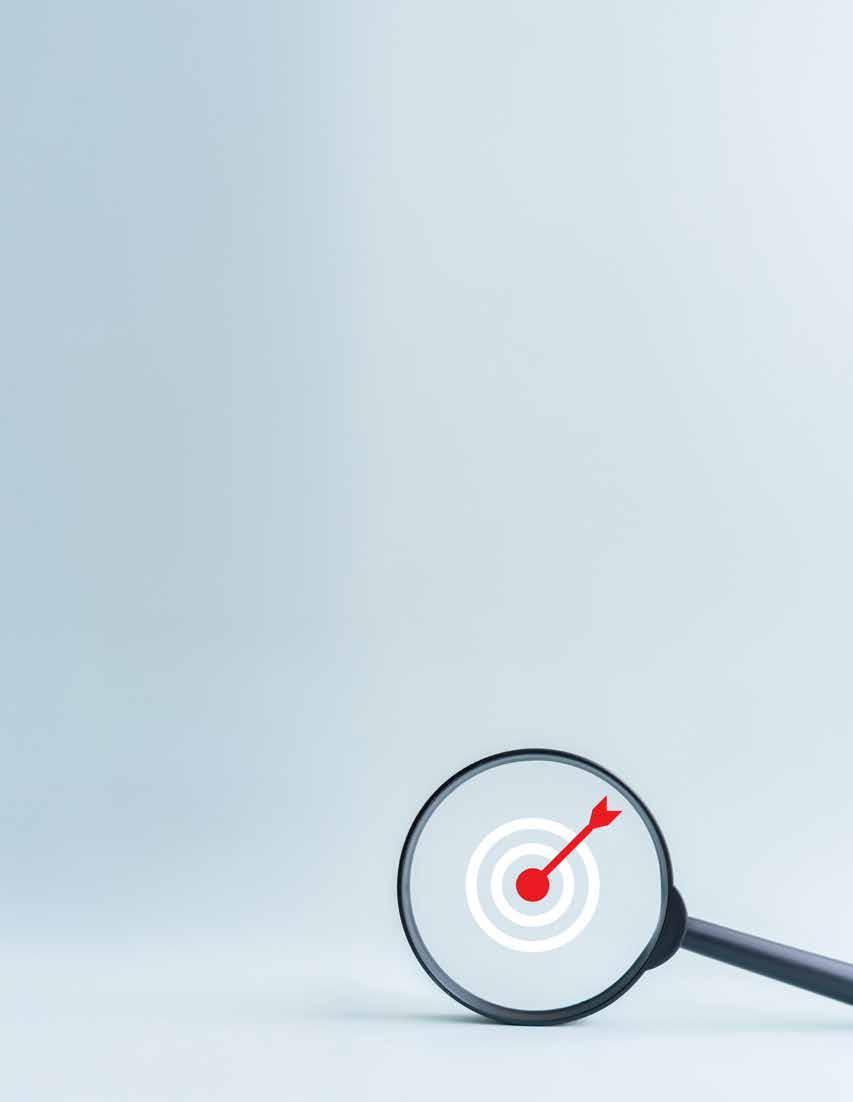
The 2024 Strategic Plan focused work across six strategic pillars leading to multi-year highs in three-year graduation rates, improved outcomes across all student populations and growing enrollment in adult education, dual credit and college-level programs.
Using a futures-thinking approach, the College collected input from over 2,000 individuals, including business leaders, community stakeholders, students and employees during its planning process. The voices of the community and students affirmed the importance of CLC’s role as a catalyst for educational attainment that leads to familysustaining living wages and shared prosperity for each citizen. Participants answered questions about what they saw as the future of the Lake County community and the college’s role in securing that future.
The 2030 Strategic Plan guides the college’s continued pursuit of excellence through three strategic pillars that are aligned to the over-arching themes that emerged from the input sessions. The steps forward deepen the college’s commitment to a student- and community-centered approach to advance regional workforce needs. CLC’s pillars and strategies steer toward a preferable future in which CLC contributes as an engine of economic mobility and as a community catalyst.
2030 STRATEGIC PLAN PILLARS
STUDENT ACCESS AND SUCCESS
Key ideas: Affordable access, student success resources, relevant pathways and integrated career and learning experiences
COMMUNITY VIBRANCY
Key ideas: Education and workforce pipelines and being a community catalyst
FUTURE-READY ORGANIZATION
Key ideas: Organizational agility and digital transformation
At the launch of the 2024 Strategic Plan, College of Lake County set forth a bold vision to transform access to college and increase success for each student. At the time, CLC had a 50-year history of providing high-quality educational opportunities in Lake County. However, college leaders recognized the need for a future-forward institution implementing evidence-based practices to help every student achieve their goal.
“Sustaining what works well while making meaningful improvements takes coordination and intentional design,” said Assistant Vice President of Strategic Advancement Dr. Nick Branson. “That’s why we created the Lancer Success Framework, a purposeful design of the student experience from first connection with CLC through graduation and into the workforce or further education. Named after our Lancer mascot, the framework is built on feedback from students and other stakeholders, along with research from topperforming community colleges across the country.”
The guided structure is anchored by CLC’s definition of student success:
Achieving educational attainment for every student by providing personalized, culturally relevant student learning experiences, grounded in equitable practice in an inclusive, student-ready environment.
Key experiences for students, like completing orientation and meeting with advising staff, are highlighted in the framework. Each experience is organized within a whole-
EARLY CONNECTIONOPTIONS CONVICTION

college system designed around students’ journeys as they link to CLC, launch into their first year, learn in classes and clubs, and leap to a four-year institution or transition to a career.
With a vision for the student experience in mind, CLC set out to ensure this experience is available to everyone, in ways that are tailored to meet individual needs. One of the first steps was to transform crucial support services to guide students seamlessly through their journey from start to finish. Revising a disjointed model that caused students to bounce between departments, CLC developed a new model for student onboarding, first-year experiences, and advising.
LINK LAUNCH LEARN LEAP
LANCER SUCCESS FRAMEWORK
CONNECTIONOPTIONS
SUPPORT FROM THE START
The model begins with College and Career Navigators (CCNs) who serve as personal guides for new students. With eight full-time CCNs embedded at local Lake County high schools and nine more serving across the community, including a dedicated team focused on adult learners, CCNs meet individuals where they are and help advise them as they enroll and achieve their goals in their first semester. CLC also expanded dual credit offerings with high schools, increasing the number of Lake County students earning college credit through CLC before they graduate. Notably, 51% of all 2025 Lake County high school graduates applied to CLC.
Director of Student Recruitment and Onboarding Dr. Jacob Cushing explained, “Partnering closely with high schools plays a critical role in supporting student success. When CCNs are part of a school’s culture, students gain access to a consistent, trusted resource. This early connection helps students explore their options, plan with purpose, and build a clear path to college. We’ve seen that students who engage with a CCN are more likely to succeed, and having that support housed within their high school has made a measurable difference in helping them see college as an achievable next step.”
To prepare for their first semester, students are welcomed at New Student Orientation where they meet faculty, support staff and peers. Each student meets their Academic Success Advisor (ASA) who specializes in the student’s field of interest and can guide them from their first semester through completion and make plans for after CLC. Another offering, the College Success Seminar, further supports students as a cornerstone of the first semester learning experience. Each element of this student support model works together, so it is by design rather than by chance that students receive the guidance they need each step of the way.
COLLEGE THAT LAUNCHES CHAMPIONS
As a result of these significant changes, CLC is nearing the top third of all community colleges across the country. In 2025, CLC was recognized nationally as a Leader College
of Distinction by Achieving the Dream, a non-profit network supporting community colleges’ improvement efforts. This designation places CLC among the top 10% of more than 400 institutions.
Graduation Rate Highlights
+9 percentage point increase over 5 years
Why the First Term Matters
Students’ first term is critical — it sets the stage for timely credential completion.
Students
Meeting Credit Threshold for On-Time Completion
Growth at a Glance
CLC enrollment steadily increased over four years and exceeds pre-pandemic levels due to proactive efforts in enrollment and retention.



Katherine Torres served as president of the Student Government Association (SGA) from April 2024 to April 2025. While pursuing a degree in biology and public health, Kat is deeply involved in student life and dedicated to advocating for her peers on campus and across the state of Illinois.
Q: Tell us a little about yourself and how you got started at CLC.
I started at CLC after graduating from Round Lake High School. It was close to home and financially affordable, two things that made a big difference for my family and me. I received scholarships and joined the Honors and Scholars programs, which opened so many opportunities. I plan to either become a physician assistant or work on the legislative side of public health.
Q: What is something you’re most proud of during your time at CLC?
My development as a leader. I came in as a shy, unsure 18-year-old. But I felt called to lead, and CLC gave me the support to grow into that. I was encouraged to attend meetings, learn about college policies and
Q&A with Katherine Torres, Student
procedures and understand how change really happens. That experience helped me build confidence and taught me how to effectively communicate and speak publicly. I learned to advocate, not just for myself, but for other students, too.
Q: How has CLC changed during your time here?
When I joined SGA in 2023, there were very few participants. Through efforts with other student leaders, we significantly increased student participation, not just in SGA, but in clubs and organizations across all campuses. There’s a common stigma that community colleges don’t have much going on, but that’s simply not true. There are events, activities and opportunities all the time. For example, we held an Olympics-like competition, where student groups competed in games like tug-of-war and the Oreo challenge. Everyone made their own banners and shirts. It was a very competitive, fun way to build school spirit and show off our vibrant student life.
Q: What makes CLC unique in how it serves students and the community?
CLC truly goes above and beyond to meet student needs. Programs like the Lancer Emergency Assistance Fund and SHARE Market food pantry provide essential resources. As someone with ADHD working two jobs and an internship, I know how hard it is to juggle everything. There’s constant pressure to succeed, while also figuring out how to support yourself financially. This is the reality for many students, and CLC understands that. It’s not just about classes—it’s about helping students survive and thrive.
Q: What role have you played in the evolution at CLC and how do you see the change impacting student outcomes?
It’s been a team effort, but I’m proud of the role I’ve played in elevating SGA into a powerful resource for students. I help coordinate events, manage our social media and take advantage of professional development opportunities. That’s led to real results, including some of our members landing internships and jobs in their fields. One major moment was traveling to Springfield on Lobby Day to advocate for more funding for community colleges and student services. That experience taught me how to advocate not just for myself, but for students across Lake County and the state.
Q: What excites you about the future of CLC?
I’m excited to see students continue to get involved, plan new events and make their voices heard. We can do so much when we work together. And I hope we’ll be able to offer bachelor’s degrees at CLC in the future. For many students, this is their only college option. Expanding degree offerings would mean more opportunities to meet Lake County’s workforce needs and give students a real shot at success.

In May 2025, Kat Torres was one of seven CLC students who received the 2025 Excellence in Leadership and Service Award for her dedicated service to students.

QUITY STUD NT FOR EVERY
To improve the student experience, CLC recognized that progress must be achieved for every student to achieve their goals. Guided by the mission to serve all members of Lake County’s diverse community with equitable, high-quality education, CLC made Equity and Inclusion a central pillar of the 2024 Strategic Plan.
At CLC, teams examine real-life, community-based data on educational opportunity and find ways to unite the college community around shared, intentional commitments that are responsive and improve outcomes for all students.
For example, in 2019 when CLC launched its 2024 Strategic Plan, local data revealed that not every person in every demographic group had equal access and resources to achieve their educational goals. About 8% of households in Lake County were at national poverty thresholds. These realities often put working toward an affordable education at CLC out of reach. Data showed that by the time they were 27 years old, Lake County residents who grew up in lowincome households were making less than half the earnings of their peers who grew up in high-income households.
Vice President of Strategic Advancement Dr. Derrick Harden said, “Education can change this trend and provide economic mobility, but only if everyone in Lake County has access and is supported to succeed.”
FACING THE FACTS, RESPONDING WITH PURPOSE
In 2019, about half of all Lake County residents aged 25 and older had a college credential, compared with one-third of Black/African American residents and less than one-fifth of Hispanic/Latinx residents. CLC data revealed that students of color were not making the same gains as the overall student population.
Leveraging data and input from college stakeholders and aligning to its Strategic Plan, CLC established an Equity in Student Access and Success Plan. Key performance indicators like student credit accumulation, persistence between terms, and completion created an evidence-based picture of CLC’s current state. Using these metrics, CLC work teams set ambitious targets to eliminate institutional equity gaps while improving outcomes for all students over the following five years.
REMOVING BARRIERS TO SUCCESS
One project focused on resourcing students for success. CLC reviewed all its offerings to students related to academics, finances, technology, mental health, basic needs and more, and then took steps to make improvements and address gaps. During the COVID-19 pandemic, for example, CLC introduced virtual tutoring sessions and, in the years that


followed, added evening and weekend access to tutoring to better match students’ schedules. The CLC library rolled out a program in which students can check out laptops, internet hotspots, or graphing calculators and keep them for the entire semester.
“We expanded academic supports with a focus not only on what we offer but when and how students can access them,” said Director of Student Academic Success Dr. Eric Tammes.
“We are committed to helping students connect with CLC’s many free resources.”
Recognizing that students may encounter challenges to their mental and physical well-being during college, CLC boosted supportive options in these areas as well. Expanding mental health services ensures that students across campuses have

access to professional counselors; whereas investing in the SHARE Market, CLC’s food pantry, ensures that students can routinely pick up free snacks, meals, school supplies and personal hygiene products.
Emily Borland is CLC’s community resource coordinator, a position specifically created to connect students with community-based resources and public benefits. Referring to agreements with Community Youth Network Counseling and Lake County Coalition for the Homeless, Borland explained, “At CLC, we’ve built strong relationships with community partners to better support our students in overcoming challenges beyond the classroom. By working with community partners, we uplift one another and create a stronger foundation for student success.”
FINANCIAL SUPPORT THAT MAKES A DIFFERENCE
Paying for college remains a challenge for many students, and for some, all it takes is a flat tire to cause enough financial strain to stop-out of their education. In addition to providing an affordable and quality education, CLC enacted multiple financial support strategies.
Executive Director and Chief Development Officer of the CLC Foundation Leigh Ann Jacobson said, “Thanks to the generosity and compassion of donors, the CLC Foundation provides more than scholarships. Gifts to the Lancer Emergency Assistance Fund help students navigate unexpected hardships—from car repairs to housing or food insecurity— so they can stay focused on their education. When life throws up barriers, donors help clear the path forward.”
With the help of the CLC Foundation, student emergency assistance funds increased to about $170,000 annually (from $10,000-$20,000 in prior years) to help more students address unpredicted expenses and continue at CLC. More than $25.8 million in grant funds provided during the COVID-19 pandemic supported nearly 15,000 students. CLC also invested in efforts to create free or reduced-cost textbooks, saving students more than $2 million each year. CLC also secured more than $10 million in state grants through the Workforce Equity Initiative, Climate and Equitable Jobs Act, and Pipeline for the Advancement of the Healthcare Workforce program to fund students working toward credentials for jobs in high-demand fields.
ACCESS ACROSS LAKE COUNTY
CLC also focuses on serving students and community members across Lake County. The opening of the Lakeshore Campus Student Center in Waukegan in 2023 is a demonstration of this commitment. The 63,000-square-foot building was funded by a $35.9 million investment through Rebuild Illinois, Governor J.B. Pritzker’s bipartisan capital plan and $12 million in matching funds from CLC. The Student Center provides students and community members access to educational offerings, support services and gathering spaces to achieve their goals.
Harden explained, “Not every student attending CLC needs all the academic, technology, mental health, basic needs and financial resources that have been developed. However, as an open-admission institution, CLC is committed to support students by ensuring access to wraparound resources that can help them succeed.”
EVIDENCE OF PROGRESS AND A VISION FORWARD
Data shows that efforts are paying off. The rates of CLC students succeeding in their courses, “persisting” by taking classes in consecutive semesters, and graduating each year are all rising, with notable increases in populations who historically have experienced low graduation rates. These outcomes mean more students graduate and are workforce ready. Even with these successes, the work does not stop or slow down. In response to results of a campus climate survey completed in 2024, CLC is diving into the data to better understand and improve the experiences of students, faculty and staff from every background. Looking to the future and the 2030 strategic plan, CLC will continue to improve so every member of the diverse Lake County community has access to successfully complete a highquality college credential.


For Jesus Ruiz, leading the Lakeshore Campus in Waukegan is personal. His passion for education, equity and transformation fuels his mission to ensure that CLC delivers on its promises to the people of Lake County.
Q: Tell us a little about yourself and how you got started at CLC.
I’ve served as dean of the Lakeshore Campus for the past six years, but my connection to this community began long before that. I moved to Waukegan in the early ’90s as a 10-year-old and saw firsthand both its vibrant spirit and the challenges it faced, including the condition of the CLC campus at the time.
After starting my public service career at the Lake County Health Department, I realized I wanted to help the community through education. I’m passionate about helping Latino and African American students reach their potential. Community colleges are where that journey often begins, and preparing students here at CLC means preparing them to succeed wherever they go next. I know this community, and I know what our students need. That perspective helps me lead effectively with honesty, transparency and trust. When you work for a community like ours, and you have their back, they’ll have yours.
Q&A with Jesus Ruiz, Dean, Lakeshore Campus
Q: What is a noticeable positive change you’ve seen over the past five years?
Lakeshore Campus is now part of every conversation. I participate in meetings with the park district, the city and the health department, and I hear time and again, “CLC is doing incredible work.”
Students now walk into spaces they’re proud of, that symbolize how much CLC is investing in their futures. That pride changes how they show up. They respect the space. They take care of it. And they feel a deeper sense of belonging.
Q: What is special about how CLC has evolved to meet student needs and challenges?
One of the biggest game-changers has been tapping into equity-focused funding like the Workforce Equity Initiative and Climate and Equitable Jobs Act (CEJA) grants. These programs allow CLC to support students who have historically been left behind, including people who are unemployed and people who’ve been incarcerated. These grants do more than cover tuition. They help pay for daily life expenses like rent, bills and emergencies so students can stay focused on learning.
We’re also breaking down language barriers. Lake County has an increasingly large Latino population, and many community members still face challenges with English. Rather than see that as a limitation, CLC sees it as an opportunity. CLC launched an early childhood education certificate program delivered in Spanish, and more offerings like it are being developed. We’ll teach you the language and the skills at the same time. That mindset is shifting our institution. At Lakeshore, where more than 70% of our students are Latinx, serving them in their language and culture isn’t optional. It’s essential.
We’ve also expanded wraparound supports. When the tutoring center moved into the Student Center, usage jumped from 17 students a week to 70. Our SHARE Market is stocked and well-used. We’re partnering with local organizations to connect students to housing, therapy and healthcare. Engagement outside the classroom is stronger than ever because students trust that we’re here for the whole person, not just the transcript.
Q: What excites you about where CLC is heading in the future?
I’m a dreamer. I love imagining what’s possible and then helping bring it to life. That’s exactly what we’re doing at Lakeshore. We’re building something powerful, a place where students thrive, where our community feels seen and where real opportunities are created. We’re building a legacy of access, equity and transformation. And that’s the kind of dream I’ll always chase.
Closing
Gaps, Increasing Momentum First-to-Second Year Persistence
Equity Emerges as Core Strength
Employees rank equity as CLC’s top organizational strength for community college success
Boosting Emergency Support for Students
Lancer Emergency Assistance Funds grew from $20K to $170K annually
INVESTING IN LEARNING EXCELLENCE
FACULTY ARE AT THE HEART OF STUDENT SUCCESS
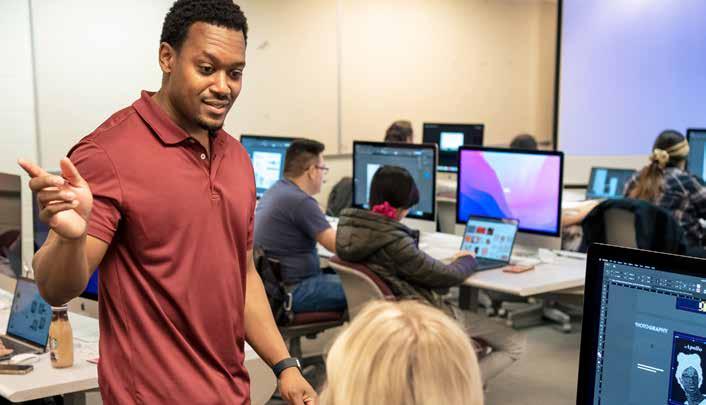
At CLC, the mission is clear. Every student deserves an equitable, high-quality education. Behind that mission is a committed group of faculty who bring not only academic knowledge but also mentorship and care to students. To help them thrive, CLC is making significant, thoughtful investments in faculty success, giving them the time and tools to nurture their role as exceptional educators.
“It all comes back to teaching and learning excellence,” said Vice President of Education Dr. Kristen Jones. “CLC wants faculty who are culturally responsive, implement active learning strategies, and are pedagogically skilled. We are committed to providing opportunities for professional learning and encourage continuous improvement. All these things lead to the success of our students. We believe as a
Faculty member Jason Rodgers
college that an investment in faculty is an investment in student success.”
EMPOWERING TEACHING AND LEARNING
CLC is commited to its teaching and learning excellence strategy, which is central to the Faculty Success Framework. By examining their teaching through data, participating in meaningful professional development and connecting academic support with classroom learning, faculty strengthen the learning experience for every student. CLC supports more than 220 full-time and more than 940 adjunct faculty members.
A STRONG START FOR NEW FACULTY
New full-time faculty begin their journey with an orientation designed to introduce them to CLC’s culture and values. This week-long orientation provides an overview of college systems and resources while offering time for reflection on teaching strategies. It’s more than a welcome session. It’s the beginning of an experience that helps faculty build community and navigate the path to tenure.
Support continues through the New Faculty Institute (NFI), a multi-year professional development program now in its third year of implementation. New faculty join a weekly seminar-style course focusing on teaching pedagogy, mentoring and support. In the second year, they complete the Association of College and University Educators course on Effective Teaching Practices and in their final semester, attend the Great Teachers Seminar and engage in a learning community with peers across disciplines. Faculty are provided three hours of release time from teaching during all semesters of NFI to allow them time to focus on reflection and learning.
Academic Director of Faculty Professional Learning
Dr. Page Wolf said, “It’s not just about compliance or checking a box. It’s about making space for deep reflection learning and growth as educators.”
This year’s cohort of more than 20 new faculty members includes instructors of nursing, early childhood education, English as a Second Language, library science and
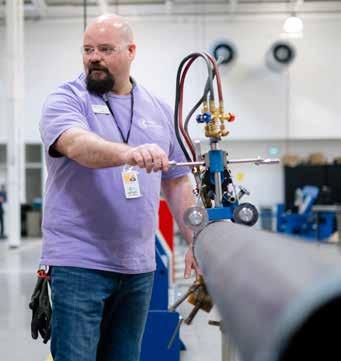
Faculty member Johnny Ryzmowski
engineering. Although they teach different subjects, they quickly built a sense of camaraderie and collaboration. Many shared inventive ideas and effective teaching practices. The experience created an open, supportive environment in which faculty felt safe to ask questions and share strategies.
Michael Chapa became an HVAC instructor, after gaining experience working in the industry. He described how participating in the NFI was pivotal to his early success as an instructor, allowing space for questions, knowledge, instruction and camaraderie.
“We were a group of strangers turned friends, and I soon looked forward to our weekly meeting, knowing it would be an opportunity to get answers to the challenges I was facing that week,” Chapa said. “As with anything in life, you get out of it what you put into it, and I was lucky enough to be blessed to belong with an amazing group of peers and talented faculty.”
Business Administration instructor Marcus Morgan had a similar experience, “The genuine bonds developed during the institute led to an information transfer that was
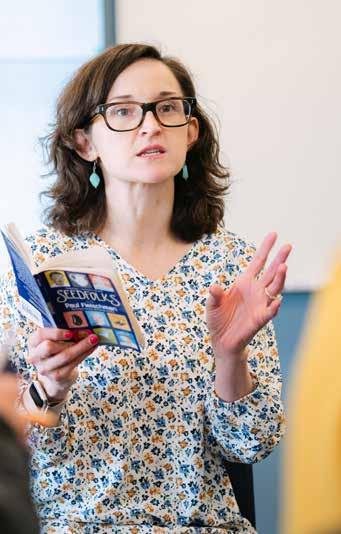

invaluable to all of us. Whether you were a long-time CLC adjunct, or someone who recently obtained an academic credential, the bonding that took place was paramount to our future as Lancers.”
“I am extremely grateful for an institution that invests so much in its faculty, who are on the front lines of impacting our greatest stakeholders – students.”
- Marcus Morgan
SUPPORTING ADJUNCT FACULTY WITH INTENTION
CLC is fortunate to have outstanding adjunct faculty who play an essential role in student success. The college makes a point to welcome and support these part-time instructors before the start of each semester. The orientation offers guidance on available resources and reinforces CLC’s student-centered values.
Adjunct Faculty Development Coordinator Selena Woods brings her experience as a former adjunct to the role of helping these instructors feel a sense of belonging and professional respect.
“We want every adjunct instructor to feel welcomed, connected and supported from day one,” Woods said.
“Whether you’re coming from a career in higher education or bringing valuable industry expertise, you’re not alone here. We walk alongside you, offering meaningful professional development, encouraging continuous growth and ensuring you have the tools to succeed. When our faculty feel valued and empowered, our students thrive too.”
Many adjuncts teach at multiple colleges in the region and consistently say that CLC goes above and beyond in welcoming them and supporting their work. This intentional
Faculty member Robert Lossmann
Faculty member Alyssa Micek
inclusion is part of a broader strategy that benefits not only the faculty but also the students.
CREATING A CULTURE OF COLLABORATION
Faculty development is supported at the Teaching, Learning and Educational Technology Center, a gathering space for collaboration and support. It also serves as a hub for professional development, helping faculty reflect on pedagogy and stay updated on instructional practices.
By creating opportunities for faculty to connect with each other, CLC helps reduce isolation and foster a sense of community. These connections often spark innovation in the classroom as faculty apply strategies and ideas shared by their peers.
In addition to teaching responsibilities, faculty are active in committees and initiatives that serve the broader student community. Their contributions stretch far beyond the classroom and are grounded in a shared commitment to student success.
LOOKING AHEAD WITH PURPOSE
As part of a forward-thinking approach, CLC is developing dashboards to measure faculty engagement in activities directly connected to student success. Built on the Faculty Success Framework, this tracking method will measure multiple data points that serve as indicators of teaching and learning excellence. The purpose of the dashboard is to leverage data to optimize the connection between faculty success and student success.
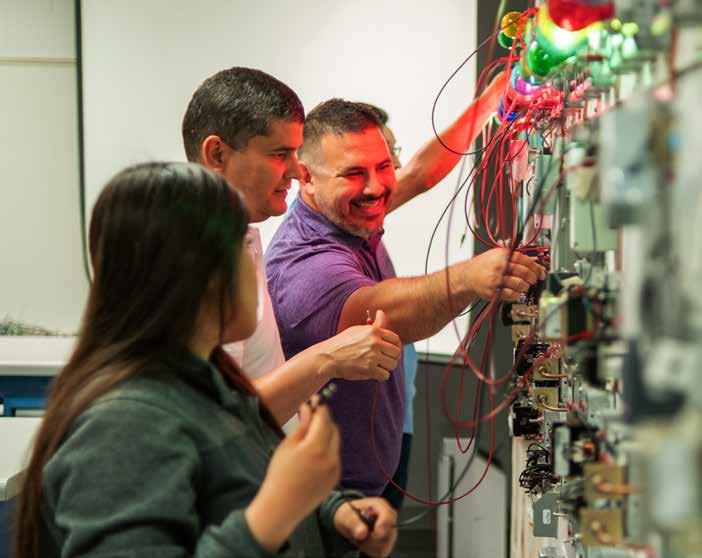
Faculty member Michael Chapa

Dr. Brent Steffens brings psychology to life through hands-on activities, real-world connections and thoughtful use of current events to keep material engaging and relevant.
Q: Introduce yourself and your connection to CLC.
I took my first psychology course at CLC way back when I started my college career, and it paid dividends. It sparked my curiosity and shaped the direction of my academic and professional life. Today, I’m a tenure-track faculty member in psychology, and I’ve been teaching at CLC for two years.
I see myself as a student advocate above all else. From the faculty to the deans, there’s a strong culture here that places students at the center of every conversation. I believe in literally meeting students where they are, whether that’s hosting office hours in the cafeteria or being present at campus events like orientation or commencement. Our students are climbing their own ladders, and I see my role as offering them “sticky notes of knowledge” that help them continue the climb. It’s easy to champion students in an environment that’s built around their success.
Q&A
with Dr. Brent Steffens, Psychology Instructor
Q: What’s changed at CLC?
I’ve noticed a significant and positive shift in how we approach student needs. There’s a growing emphasis on meeting students where they are, both figuratively and literally. We’ve moved away from the traditional model where faculty dictate the terms and students follow. Instead, we shape ourselves around the real needs and challenges our students face.
Many of our students are balancing work, family responsibilities and other commitments alongside their studies. As educators, we are becoming more holistic in our approach. We help students navigate mental health, career advising and personal growth. There is no one-size-fits-all model anymore. Helping students connect the dots between their identity, their goals and their academic paths brings out the best in them. We are building a stronger sense of community where students can belong, find their people and be supported.
Q: What’s special about how CLC has adapted to meet the needs of students and faculty?
There’s a genuine encouragement of innovation. I’ve had the opportunity to mentor students through original psychological research, and I’ve brought their voices to life through our podcast and radio show, The Ball is in Your Court. We highlight student perspectives, promote campus resources and celebrate accomplishments across the college. I’ve even had one of my students present their research at an international conference. Experiences like these are possible because of CLC’s supportive culture and its student-centered approach. It’s not just about classroom learning. It’s about creating enriched, authentic and empowering experiences.
Q: What role have you played in CLC’s evolution, and how do you see that impacting outcomes for students?
I see my role as a connector. I engage with different departments to bring best practices into the classroom. Students see faculty every day. We are often the most consistent presence in their academic journey, so we have a responsibility to elevate that experience.
Q: What excites you about where CLC is heading?
I’m energized by how CLC continues to deepen its roots in the community. For example, a fellow faculty member took her students to the courthouse for an immersive learning experience. There are amazing opportunities for community building and scholarship through programs like student governance, Phi Theta Kappa (PTK) Honor Society and the CLC Scholars program. In my social psychology class, we’ve connected with the SHARE Market to help students learn while giving back. These partnerships make education relevant and help bridge the gap between the classroom and the world around us.
Dr. Steffens received the 2025 CLC Outstanding Full-Time Faculty Member Award. This award is selected annually by students.
Faculty Highlights
More than 200 full-time and adjunct faculty have enhanced their teaching through credentialing in effective practices, with many also earning specialized micro-credentials in areas like active learning, equity and student belonging—contributing to measurable gains in student course completion.
Growth at a Glance
Amid the challenges of the pandemic, CLC students achieved a 3.8-point gain in credit completion and a 5.2-point rise in fall-to-fall persistence—growth driven by redesigned advising, onboarding and first-year experiences, and a strong faculty commitment to equityfocused, active learning.
When Teachers Grow, Students Thrive
CLC’s strategic support for faculty has led to higher student course success and national gains in active, collaborative learning.
Connect with Purpose: Investing in Lake County’s Workforce and Community
Education drives the economy and outcomes for communities. College of Lake County is committed to enhancing the vitality of the region’s workforce by building meaningful, results-driven partnerships with employers, educators and community leaders. These collaborations ensure that students are educated and equipped to meet the workforce needs of the region’s dynamic, evolving economic ecosystem.
“CLC is creating pathways to prosperity that uplift individuals and energize our local economy,” said Vice President of Community and Workforce Partnerships Dr. Ali O’Brien. “When we align education paths with industry needs, we create opportunity for students, families and the entire region.”
A Strategic Response to a Workforce Pipeline Crisis
conducted research, leading to a clear, datadriven conclusion to focus on addressing the talent pipeline crisis in sectors critical to Lake County’s economic stability.
O’Brien explained, “We studied labor trends, listened to our industry partners and asked a critical question: Where can we make the biggest impact? The answer led us to manufacturing.”
Manufacturing: The Economic Powerhouse of Lake County
Lake County is the second-largest manufacturing county in Illinois, generating approximately $48 billion in economic output. One in every seven jobs in the region is related to manufacturing, and manufacturing is constantly changing. The Industrial Revolution 4.0 introduced automation, robotics and precision technologies requiring a more skilled and technologically fluent workforce. Modern factories are no longer loud, gritty spaces. They are clean, efficient and filled with advanced equipment that demands logic, accuracy and technical know-how.


To address these realities, CLC made a bold investment by transforming a vacant big-box retail store into the Advanced Technology Center (ATC). Opened in 2022, the ATC features cutting-edge machinery, hands-on learning spaces and industry-grade laboratories. CLC invested approximately $37 million in construction, equipment and upgrades, along


Regional Hub
The ATC is now a regional hub for manufacturing, education and community engagement. Thousands of students have received training on the industry-standard equipment, including many high school students who take dual credit classes to earn college credits before graduation. The ATC’s two flagship programs—Industrial Technology and Welding and Fabrication Technology—are designed with flexible schedules so students can attend classes and work or manage other responsibilities. Classes are led by instructors with technical expertise and workforce experience.
ATC Director Dr. Jon Hardbarger said, “We’re ensuring the next generation has the technical skills to drive American manufacturing long into the future. The ATC is also a place where the Lake County community connects and explores technology and manufacturing. We’re thrilled to host high school manufacturing events, robotic competitions and community and corporate gatherings.”
At the ATC, community members engage in tours, industry meetings and events to raise awareness about modern manufacturing. Each year, the team welcomes hundreds of local leaders, families and school groups, and has even hosted pop-up exhibits from Kohl Children’s Museum designed to interest the youngest community members. Every visit to the ATC helps dispel outdated notions about
what a manufacturing site looks and feels like and inspires new generations to consider careers in this essential field.
Securing Resources and Building Regional Alliances
The success of the ATC has attracted nearly $10 million in external resources from prominent organizations including the National Science Foundation, Metallica’s All Within My Hands Foundation, the Workforce Equity Initiative, the Illinois Climate and Equitable Jobs Act and the U.S. Department of Labor. These investments support scholarships, expand access and enhance training opportunities.
Executive Director of Community Programs Jim Connell said, “Our aim is to be the driving force in Lake County, connecting employers with vital resources—our students, community members, fellow businesses and even funding opportunities from our partners at Lake County Workforce Development.” CLC works with each of these groups as a strong advocate to bring them together in both formal and informal ways.
“That’s the role of our team: connector, catalyst, and champion for collaboration,” said Connell. “When these connections happen, Lake County grows stronger.”
To further advance the regional workforce ecosystem, CLC launched the Manufacturing Alliance, a coalition of employers, educators and advocates who collectively model excellence in the field. The Alliance serves as a platform to shift perceptions of manufacturing, strengthen local supply



chain connections and align industry needs with educational programming. By fostering shared expertise, this group reinforces CLC’s role as a convener of innovation and opportunity.
Expanding Impact To All Industries
While manufacturing remains a top priority, CLC’s strategic workforce initiatives extend to other highdemand industries. For example, the college received a multi-year $3.54 million Pipeline for the Advancement of the Healthcare Workforce Program grant to help students pursue careers in healthcare fields like nursing, surgical technology and phlebotomy. These programs address the critical need for healthcare professionals across Lake County, while reducing students’ financial barriers through stipends that pay for tuition and fees. The funds also pay for new equipment, tutoring services and support staff.
Education is another sector of focus. Thanks to a donation from the Schreiber Foundation, CLC hired faculty to deliver early childhood education instruction entirely in Spanish. This initiative not only supports Spanish-speaking students but also ensures culturally responsive teaching that meets the needs of Lake County’s multilingual families and communities.
Institutionalizing Community Investment
These efforts will continue to be guided by the 2030 Strategic Plan, which emphasizes community vibrancy. What began as a focused effort within CLC’s Community and Workforce Partnerships unit has evolved into a collegewide commitment to community investment. The 2030 Plan reflects a shift in mindset to ensuring external partnerships are embedded across the entire institution.
“Every unit, classroom and initiative is now seen as an opportunity to invest in the external community,” said O’Brien. “CLC is not only building external partnerships; it is also refining internal structures to support and sustain them. This philosophy ensures the college is prepared to meet the future with intention, accountability and collaboration.”
A Collective Commitment to Lake County’s Future
Through bold investments in facilities like the ATC, strategic partnerships across sectors and a vision grounded in equity and innovation, CLC is creating a more inclusive, skilled and economically vibrant region.
“‘Connect with purpose’ is our call to action,” O’Brien said. “It’s how we’ll continue to lead, partner and grow alongside the communities we proudly serve.”
CLC will continue to lead with purpose, ensuring every connection strengthens the foundation for a more resilient, inclusive and prosperous Lake County.

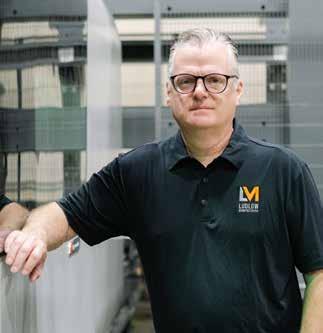
Todd Ludlow is the president of Ludlow Manufacturing, Inc., a metal fabrication company based in Waukegan. A CLC graduate and dedicated workforce partner, he has spent three decades connecting with CLC—building his future and guiding the talent of tomorrow. He recently became an inaugural member of CLC’s Manufacturing Alliance, serving on the executive committee and lending his expertise to drive the regional manufacturing sector forward.
Q: Introduce yourself and your connection to CLC.
As the leader of a local manufacturing company, I proudly serve on the Welding and Fabrication Technology advisory committee at CLC and am an alumnus, having graduated in 1992.
Q: What is a noticeable positive change you’ve seen in CLC in the past five years?
I’ve observed significant and commendable progress at CLC. One of the most impactful developments has been the opening of the state-of-the-art Advanced Technology Center (ATC). Additionally, the college
Q&A with Todd Ludlow, Business Partner
has made meaningful strides in strengthening its collaboration with local businesses, ensuring that educational programs align more closely with the skills and competencies we seek in the workforce.
Q: What role have you played in the evolution at CLC and how do you see the change impacting workforce outcomes?
Through Ludlow Manufacturing, Inc., I’ve had the privilege of serving on multiple advisory committees at CLC. I genuinely feel that our input has been valued and acted upon—something that is not always the case in educational settings. I deeply appreciate the college’s leadership and their dedication to making a lasting, positive impact on Lake County’s workforce and community.
Q: What excites you about where CLC is heading in the future?
Most recently, I’ve joined the executive committee for CLC’s Manufacturing Alliance—an initiative that CLC has not only supported with time and expertise, but also with financial resources. I’m excited to see the Alliance grow and am confident that, with CLC’s continued support, it will drive meaningful progress for businesses across the county.

Collaborative
Employees at CLC know improving student and community outcomes takes a whole team working together. Every employee’s specific role contributes to this work each day. Ensuring every employee understands the college’s values and has a sense of belonging builds a culture where employees and students thrive.
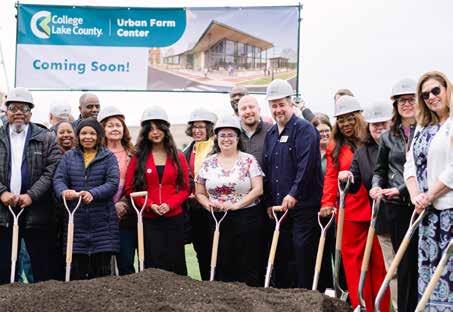
Collaboration is a key aspect of the way culture is experienced at CLC. Through collaboration, CLC employees demonstrate ways to live out the values of excellence, purpose, integrity, compassion, unity and inclusion. Examples of collaboration include inviting colleagues’ input to improve systems, to weigh in on or share ideas about decisions that could affect them, and to work together on cross-college project teams.
Since the launch of the 2024 strategic plan, meaningful work has been completed to address culture and collaboration so CLC can accelerate the transformational change necessary to improve student outcomes and community impact. Much of this work has been built for employees by employees.
“One of the most impactful projects of the 2024 Strategic Plan for CLC employees has been the buildout of the FirstYear Experience,” said Director of Human Resources Katie Sweeney. “We acknowledged that if employees were not having a positive, enriching experience in their roles, how could they, in turn, provide a great experience to students? So, we formed a taskforce to ask questions and look through the eyes of the employees, not through the eyes of the


Culture in Action:
Designing the Employee’s First-Year Experience
organization, to establish a personalized experience that would help set every employee on a course for success at CLC.”
The purpose of the First-Year Experience (FYE) taskforce was to be innovative and values-driven in supporting student success by developing and encouraging employees of all backgrounds on their journey toward achieving personal and professional growth and success. The team was charged to design and develop experiences that would promote a sense of belonging and community and to holistically support employees during their first year at CLC.
The eight-person team started discovery work in 2022, establishing positive relationships and open communication, brainstorming ideas, and deciding how to interview others across the college. They hosted pop-in events on each campus and asked questions of all staff members, regardless of their length of service. The goal was to find out what employees felt were important parts of the orientation and onboarding process at CLC.
When examining the qualitative data, three themes became clear. Employees in their first year are looking for
experiences, information and interactions. With this in mind, by May 2023, the team rolled out a new FYE program for incoming CLC employees. The team organized a timeline of distinct experiences, information and interactions for employees to follow during their first 30, 90, 180 and 365 days.
The timeline included when new employees should engage in learning opportunities and engaging activities across all of CLC’s campuses and specialty centers. The taskforce acknowledged the importance of fostering a “cohort mindset” for those going through the onboarding process by establishing a way for new employee cohorts to reconnect with each other throughout their first year. This has helped to forge strong relationships across the college through intentional experiences and interactions.
Furthermore, by segmenting out the experiences, information and interactions, new employees follow a wellpaced path that gives them time and space to try new things, to feel welcome, build job knowledge and skills and feel they belong at CLC.
“The First-Year Experience is more than just onboarding—it’s culture work. Originally identified within the 2024 Strategic Plan pillar of Collaborative Culture and the Employee Success Framework, we’re creating space for new employees to feel connected, supported and aligned with CLC’s mission, vision and values,” said Talent Development Coordinator Sophia Wainwright. “This foundation of belonging quietly shapes the student experience and brings our student success definition to life in powerful, everyday ways. It’s meaningful, energizing work, and I’m honored to be part of it.”
Some examples of innovations include giving CLC swag bags to new employees on their first day, setting aside time for professional development, providing information about CLC’s shared governance groups, and scheduling check-ins with team leaders.
Aleksandra Bershadskaya, co-chair of the FYE task force, said, “The taskforce also saw the value in helping employees build their own ‘success network,’ made up of the people across the college they could go to for help or support.”
Through the collective and dedicated efforts of the FYE taskforce, new employees at CLC are benefiting from the ideas and visions shared by the CLC community. Meanwhile, similar work is underway to develop a New Leader Orientation for employees who are new to leadership at CLC.


Laurie Stead is the assistant to the Chief Human Resources Officer. She coordinates quarterly efforts to celebrate CLC faculty and staff when they reach significant milestones of employment or are recognized by peers for displaying CLC values.
Q: Introduce yourself, your role at or connection to CLC:
I am a lifelong Lake County resident and a proud CLC alumna. I became employed by CLC 10 years ago and have had the opportunity to plan and coordinate many employee anniversary celebrations and awards presentation. I am a “behind-the-scenes” person, so I appreciate this opportunity to talk about CLC’s employee recognition programs.
Q: Describe CLC’s employee recognition programs.
I serve as the coordinator of CLC’s quarterly Values Recognition Awards and Milestone Anniversary Celebrations. I keep the celebration ball rolling by posting announcements to the CLC Hub (our internal communication tool), sending invitations, ordering treats, setting up the space and more.
Values Recognition Award nominations are accepted each quarter with the purpose of spotlighting CLC employees who have lived out one of the six values: excellence, purpose, integrity, compassion, unity and inclusion. It is my role to compile the
Q&A with Laurie Stead, Assistant to the Chief Human Resources Officer
submissions for the reviewers, removing names and other details to help control bias during the review process. The values recognition selection team, made up of representatives from CLC’s employee senate groups, reviews and scores the submissions. When the scores are tallied, I contact the recipients and announce the winners on the Hub. At times there have been so many awesome submissions that we have a tie!
I invite the award recipients and nominators to attend the next Chat with Lori presidential webinar, during which time the nominators read their submissions and the award recipients offer brief “acceptance” speeches. I love it when an employee hears their award nomination read to the webinar audience of 200 employees, and then speaks from their heart to accept it. The speeches are so genuinely heartfelt that they give all the webinar viewers the warm fuzzies.
After the Chat, as a final touch, the nominator personally delivers an engraved award, along with goodies, to the values award recipient. The quarterly timing of these celebratory events makes them particularly meaningful, as the work and anniversary is fresh in our minds.
It is so important to recognize employees, and each year, CLC holds four quarterly milestone celebrations to recognize those who have worked at CLC for one year, three years, five years, and so on. It is not uncommon to have multiple employees celebrating 20, 25 or even 40 years. Each celebration draws 50-100 attendees.
In the last five years, we collaborated with Engineering faculty Dr. Jan Edwards, who manages the Baxter Innovation Laboratory. She engages CLC engineering students to produce colorful acrylic CLC shields using a 3D laser and tools that one- and three-year employees receive as desk ornaments. Five-year anniversary honorees receive a CLC Yeti mug, and those with 10 or more years at CLC are invited to select an anniversary gift from a catalog.
Q: What is a change you’ve seen in CLC over the past five years?
In the past years I have witnessed so many positive changes at CLC that include branding of our hallways and exterior, to our social media presence to the programs that we are now running and continuously improving such as New Employee Orientation.
Q: What is special about how CLC has evolved to meet needs and challenges?
I appreciate CLC’s dedication and support to our employees by providing the space to meet as groups such as our employee resource group (ERGs) for the LGBTQ+ and Latinx ERG, for example. I enjoy hearing about the activities and the support these ERGs provide for one another as well as students.
TRANSFORMING INFRASTRUCTURE INTO OPPORTUNITY

CLC turns bold investments into real-world outcomes. By equipping students with state-of-the-art tools and learning environments, CLC ensures they gain an education and hands-on training that mirrors the technology and conditions they’ll encounter in the workplace, setting them up for long-term career success.
Over the past three years, CLC has completed transformative capital projects that reflect this commitment to excellence through nimble, prudent use of resources. Each state-of-the-art physical environment is designed for immersive, skills-based learning using industrystandard equipment within modern designed facilities.
These projects extend beyond the classroom. From strengthening partnerships with local industries to
offering new services and welcoming spaces, CLC’s capital investments are building a stronger future for the entire Lake County community.
“CLC has evolved significantly during my time here,” said Jamie Boller, facilities consultant from Cotter Consulting. “The growth isn’t just in square footage—it’s in purpose, ambition and community impact. Each capital project represents a piece of that evolution, improving the way students, staff and community members experience and interact with the campus.”
First-class Manufacturing Education
CLC is helping to meet local manufacturing workforce needs with the Advanced Technology Center (ATC). The ATC was created to offer world-class infrastructure for advanced technical training and meet the high-skill, high-wage and in-demand workforce needs of the sector. Students work with the latest technology in a space made to modernize the perception of manufacturing.
The ATC fills a need identified through discussions with Lake County manufacturers and key industry partners. CLC regularly communicates with external experts who work in the current industry for feedback on curriculums. This relationship led to the creation of an industrial technology program housed in the ATC.
“The center serves as a hub for innovation, featuring cutting-edge equipment that trains the next generation of the workforce and provides opportunities for individuals to



enhance their skills and certifications,” Boller said. “It reflects the college’s commitment to technical excellence and workforce development.”
Through the ATC, CLC aims to provide 40% of all local workforce needs in key industry sectors.
Modern Learning Spaces
CLC’s Lakeshore Commitment pledges to offer a wider variety of courses at its Waukegan campus and create a vibrant urban campus serving as an educational and cultural hub for the diverse Lake County community. At the heart of the campus expansion is a six-story Student Center added to the Waukegan skyline.
The ultramodern center houses centralized student services, a library with meeting spaces and study areas, adult education and career placement centers, smart classrooms, laboratories for certified nursing assistant and phlebotomy programs, tutoring center, testing rooms and support services. It meets LEED gold certification standards for sustainable architecture and a healthier planet.
On the building’s top floor, students and community members enjoy a panoramic view of Lake Michigan when

visiting the Eleanor Murkey Community Center, named in honor of the campus’s founding dean.
To further incorporate the campus in Waukegan, a series of art installations by Chicago-based artist Jason Messinger is on display. The uplifting ceramic tiles he created took inspiration from Waukegan, most notably the Latinx community.
New Home for Student Restaurant
CLC’s Hospitality and Culinary Management program found a new home through a creative and resourceful partnership with the Lake County Forest Preserves. By relocating the student-managed Prairie restaurant into the Brae Loch Golf Club, CLC avoided new construction costs and instead made a strategic $4 million investment in adaptive reuse—transforming the banquet facility into a fully functional learning lab and public dining venue.
The hands-on learning lab allows students to gain experience for a career in the hospitality industry. The space is fitted with top-of-the-line kitchen equipment. The move from the Grayslake Campus basement increases community awareness of the college’s program and how it




prepares the workforce with the latest skills. Being public facing means more traffic, giving wait staff and bartenders a chance to get realistic experience and training. That, along with increased hours of operations, gives students more opportunities to improve their skills over the same amount of time in school.
“What truly makes CLC unique is its unwavering focus on the student experience,” Boller said.
“Whether it’s a new building, upgraded classroom or improved campus amenity, every capital initiative is designed to enhance how students learn, connect and thrive. That student-centered mindset also extends to the broader community, ensuring that CLC remains a welcoming, innovative hub for lifelong learning. At its heart, CLC is about growth—not just in buildings and programs, but in the lives it touches.”

Eliza Fournier is director of CLC’s Urban Farm Center, a modern, high-tech growing space, learning lab, kitchen and market, currently under construction in downtown Waukegan. Fournier’s work involves growing and empowering the local food system in Lake County, as well as leading CLC’s Greenbelt Farm in North Chicago.
Q: Introduce yourself and your role at CLC.
I started as an environmental studies major seeing how food and farms connect people to the land and the environment that we depend on for daily life. I’ve spent my career nurturing that. To be able to grow the Urban Farm Center and generate excitement about how food can help create a more resilient environment is exciting to me.
Q: What’s special about how CLC has adapted to meet the needs of the community?
CLC has gone to bat for the people of Waukegan, in terms of getting the Urban Farm Center moving forward, because it’s something that we’ve heard our stakeholders and community members get excited about. I think it’s really special that CLC listens to
Q&A
with Eliza Fournier, Urban Farm Center Director
students and community partners. It’s such a diverse county, what’s important to one community can be very different from what’s important to another community, but we all have shared values.
The idea for the Urban Farm Center was actually brought to CLC by external partners, including philanthropic partners here in Lake County. For them to view CLC as a trusted home for their investment, and then to back that up with additional investments to make it happen is a true testament to the warmth that people feel for CLC throughout the county.
Q: How has your role evolved at CLC?
I have several hats that I wear as a CLC leader. One is, of course, the Urban Farm Center director. The vision for the Urban Farm Center, the first capital campaign that CLC has ever done, is to support all aspects of the local food system from farm to table, including growing food and how to prepare and eat food. It’s helping to create jobs, enhance health and create a sense of community in this beautiful high-tech space.
Anytime we needed letters of support, it has been so rewarding to see everyone from elected officials to partners to neighbors, stepping up with the most beautiful letters expressing their excitement about this project.
Q: What excites you about where CLC in general is heading in the future?
When I joined the college, we were on the tail end of COVID, and people were hesitant to come back
to campus. In the last three and a half years, seeing how vibrant the campuses have become again is exciting.
Since then, the ATC, Prairie at Brae Loch and the Student Center have all opened. There’s so much happening everywhere. People are feeling a real sense of ownership in Lake County for the college and pride in CLC.
I hope that everyone who steps inside the Urban Farm Center becomes an ambassador for it and for CLC. I hope that people will talk about how the Urban Farm Center helped them grow their business, grow their health and grow their understanding about what work and jobs in the food system are like. I hope that people say it’s a place you have to see.

Philanthropic Highlights
$20.8 MILLION
More than $20.8 million in philanthropic donations invested by CLC Foundation donors over the last five years, including the college’s first capital campaign to create the Urban Farm Center.
Grant Highlights
$45 MILLION
CLC has managed nearly $45 million in grant funds over the past five years to support its efforts throughout the 2024 Strategic Plan.

QUOTE ME!
“If you want to go to college, start right now. It’s probably going to be stressful, yes, but it’s going to be worth it. It’s nice to see my parents proud of me as I graduate.” - Janet Tellez
“This was a steppingstone for me to make more money for my family. With this degree, I’m able to get more of a managerial position, something I wouldn’t be able to do without it.” - Alessandra Lopez
“The people I’ve met at CLC are the best part. I’ve connected with students from all walks of life, learning about their goals, stories and aspirations. There’s always something new to learn.” - Jia Buque
“I recommend CLC to anyone. I was able to figure out what I wanted to do and gain confidence while saving money. I graduated with no debt because of CLC.” - Macie Hanson
19351 W. Washington St., Grayslake, IL 60030-1198
CLC Connects is published biannually by the Public Relations and Marketing department. To subscribe, unsubscribe or update an address, email PR@clcillinois.edu or call (847) 543-2094.
POSTMASTER:
Send change of address to CLC Connects, College of Lake County 19351 West Washington Street, Grayslake, IL 60030-1198
Volume 5, Issue 1 September 2025
FOLLOW CLC ONLINE:
www.clcillinois.edu
Board of Trustees
Amanda D. Howland, M.A., M.S., J.D. Chair
William M. Griffin, Ed.D. Vice Chair
Allena Barbato, J.D., L.M.F.T. Secretary
Dawn Abernathy, M.A.T.
Celeste Flores, B.A.
Janet Gibson, M.D.S.
Paul G. Virgilio, B.S., S.E., P.E.
Andrea Gomez Student Trustee
Lori Suddick, Ed.D. President
Trustees Emeriti
Richard A. Anderson, J.D.
William M. Griffin, Ed.D. (2021-2023)
Patricia Jones, M.Ed.
Torrie Mark Newsome, J.D.
Barbara D. Oilschlager, M.Ed.
Julie B. Shroka, M.A.


DESIGNATED HISPANIC-SERVING INSTITUTION
U.S. DEPARTMENT OF EDUCATION
STEP INTO THE FUTURE WITH CLC
CLC is reimagining education in service to community well-being and economic mobility. Grounded in inclusive input from students, community and industry, and a commitment to excellence, the 2030 Strategic Plan centers on student access and success, community vibrancy and being a future-ready organization.
Want to see what’s next? Scan this to watch our 2030 strategic plan video.


